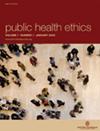健康是完全的福祉:世卫组织的定义及其以后
IF 2
3区 哲学
Q2 ETHICS
引用次数: 0
摘要
本文为世界卫生组织(WHO)对健康的定义辩护,反对广泛的批评。常见的反对理由是,在描述健康时,“完整”一词可能被误解为“身体、精神和社会上的完全健康”。这里的“完整”不一定指完美的幸福,但也可以指彻底的幸福,即包含其所有构成特征。与另一种解读一致,我认为世界卫生组织的定义提出了一个整体的解释,而不是一个完美健康的概念。我用历史和分析证据来捍卫这一解释。在论文的第二部分,我进一步研究了两种不同的健康概念(整体健康和完美健康)。我认为这两种观点都是相关的,但整体的解释更适合于政治目的。本文章由计算机程序翻译,如有差异,请以英文原文为准。
Health as Complete Well-Being: The WHO Definition and Beyond
Abstract The paper defends the World Health Organisation (WHO) definition of health against widespread criticism. The common objections are due to a possible misinterpretation of the word complete in the descriptor of health as ‘complete physical, mental and social well-being’. Complete here does not necessarily refer to perfect well-being but can alternatively mean exhaustive well-being, that is, containing all its constitutive features. In line with the alternative reading, I argue that the WHO definition puts forward a holistic account, not a notion of perfect health. I use historical and analytical evidence to defend this interpretation. In the second part of the paper, I further investigate the two different notions of health (holistic health and perfect health). I argue that both ideas are relevant but that the holistic interpretation is more adept for political aims.
求助全文
通过发布文献求助,成功后即可免费获取论文全文。
去求助
来源期刊

Public Health Ethics
PUBLIC, ENVIRONMENTAL & OCCUPATIONAL HEALTH-MEDICAL ETHICS
CiteScore
3.10
自引率
9.50%
发文量
28
审稿时长
>12 weeks
期刊介绍:
Public Health Ethics invites submission of papers on any topic that is relevant for ethical reflection about public health practice and theory. Our aim is to publish readable papers of high scientific quality which will stimulate debate and discussion about ethical issues relating to all aspects of public health. Our main criteria for grading manuscripts include originality and potential impact, quality of philosophical analysis, and relevance to debates in public health ethics and practice. Manuscripts are accepted for publication on the understanding that they have been submitted solely to Public Health Ethics and that they have not been previously published either in whole or in part. Authors may not submit papers that are under consideration for publication elsewhere, and, if an author decides to offer a submitted paper to another journal, the paper must be withdrawn from Public Health Ethics before the new submission is made.
The editorial office will make every effort to deal with submissions to the journal as quickly as possible. All papers will be acknowledged on receipt by email and will receive preliminary editorial review within 2 weeks. Papers of high interest will be sent out for external review. Authors will normally be notified of acceptance, rejection, or need for revision within 8 weeks of submission. Contributors will be provided with electronic access to their proof via email; corrections should be returned within 48 hours.
 求助内容:
求助内容: 应助结果提醒方式:
应助结果提醒方式:


